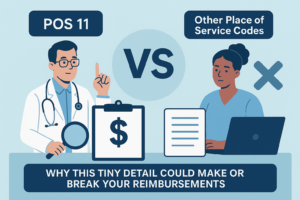Mental Health Services and Billing
Introduction
In recent years, there has been a growing awareness of the importance of mental health and well-being. As a result, more individuals are seeking professional help to address mental health concerns. However, navigating the world of mental health services and billing can be a complex and sometimes daunting task. In this blog, we will explore the various aspects of mental health services and billing, providing you with a comprehensive guide to understanding the process.
-
Understanding Mental Health Services
1. Types of Mental Health Services:
Mental health services encompass a wide range of treatments and interventions. These services can include psychotherapy (talk therapy), medication management, inpatient and outpatient programs, and various types of counseling and support groups. It’s essential to understand the specific services that may be available to you.
2. Choosing a Mental Health Provider:
Finding the right mental health provider is a crucial step in the process. Options include psychiatrists, psychologists, social workers, counselors, and therapists. Consider factors such as their qualifications, experience, specialization, and location when making your choice.
3. Insurance Coverage:
Check your health insurance policy to see what mental health services are covered. Many insurance plans include mental health benefits, but the extent of coverage can vary. Understand your copayments, deductibles, and any preauthorization requirements.
-
Understanding Mental Health Billing
1. Insurance Billing:
Most mental health services are billed through insurance. When you receive a covered service, the provider will submit a claim to your insurance company. It’s crucial to ensure that the provider is in-network with your insurance plan to maximize coverage.
2. Copayments and Deductibles:
You will likely be responsible for copayments, which are fixed amounts you pay for each visit, and deductibles, which are the amounts you must pay out-of-pocket before your insurance coverage kicks in. Be prepared to budget for these costs.
3. Prior Authorization:
Some insurance plans require prior authorization for specific mental health services or medications. Your provider will assist in obtaining this authorization if needed.
4. Out-of-Network Services:
If you see an out-of-network provider, you may have higher costs because they are not contracted with your insurance company. Check with your insurer to understand how out-of-network services are covered.
5. Billing Errors:
Review your insurance statements (Explanation of Benefits) carefully. Billing errors can occur, and it’s essential to address them promptly with your provider and insurance company.
6. Payment Plans:
If you face financial challenges, inquire about payment plans or sliding scale fees with your mental health provider. Many professionals offer flexible payment options to make treatment more accessible.
Conclusion:
Accessing mental health services and understanding the billing process is a critical step toward better mental well-being. By familiarizing yourself with the types of services available, choosing the right provider, and navigating the complexities of insurance billing, you can receive the care you need without the added stress of financial uncertainty. Remember that seeking help for your mental health is a courageous and important step towards a happier and healthier life. Don’t hesitate to reach out to a mental health professional to start your journey towards well-being.
Frequently Asked Questions about Mental Health Services and Billing
Q: What types of mental health services are typically covered by insurance?
Most insurance plans cover services such as outpatient therapy (individual or group), psychiatric evaluations, and medication management. Inpatient and intensive outpatient programs may also be covered, but it’s essential to check your specific plan for details.
Q: How do I find a mental health provider who accepts my insurance?
You can start by contacting your insurance company or visiting their website to search for in-network providers. You can also ask for recommendations from your primary care physician or seek referrals from friends and family.
Q: What if I don’t have insurance or my insurance doesn’t cover mental health services?
If you don’t have insurance or your coverage is limited, there are still options available. Some community health centers and nonprofit organizations offer low-cost or sliding-scale fee services. Additionally, you can inquire about payment plans or discounts directly with mental health providers.
Q: What is a copayment, and how much can I expect to pay for each session?
A co-payment is a fixed amount you pay for each covered session with a mental health provider. Copayments can vary widely depending on your insurance plan. They may range from $20 to $50 or more per session, so it’s important to review your plan’s documentation for the exact amount.
Q: What is a deductible, and how does it affect my mental health expenses?
A deductible is the amount you must pay out-of-pocket before your insurance coverage begins. If you have a deductible, you’ll need to cover the full cost of mental health services until you meet that threshold. After that, your insurance will start covering a percentage of the costs, and you’ll be responsible for copayments or coinsurance.
Q: How can I verify what mental health services are covered by my insurance policy?
Contact your insurance provider’s customer service department or visit their website to access the summary of benefits for your specific plan. This document will outline what is covered, any limitations or exclusions, and the associated costs.
Q: Do I need prior authorization for mental health services, and how do I obtain it?
Some insurance plans require prior authorization for specific services or medications. Your mental health provider will assist you in obtaining the necessary authorization by submitting the required documentation to your insurance company.
Q: Can I switch mental health providers if I’m not satisfied with my current one?
Yes, you have the right to choose a different mental health provider if you are not satisfied with your current one. Be sure to inform your insurance company of the change and verify that the new provider is also in-network if you want to maximize your coverage.
Q: What should I do if I believe there is an error in my insurance billing or if I receive a bill I don’t understand?
If you suspect an error in your insurance billing or receive a bill that is unclear, contact both your mental health provider’s billing department and your insurance company. They can help you understand the charges and resolve any issues.
Q: Are mental health services confidential, and will my insurance company have access to my treatment records?
Mental health services are generally confidential. However, your insurance company may require some information for billing purposes. Your provider will typically share only the necessary information to process claims while safeguarding your privacy. You can discuss confidentiality concerns with your mental health provider.






